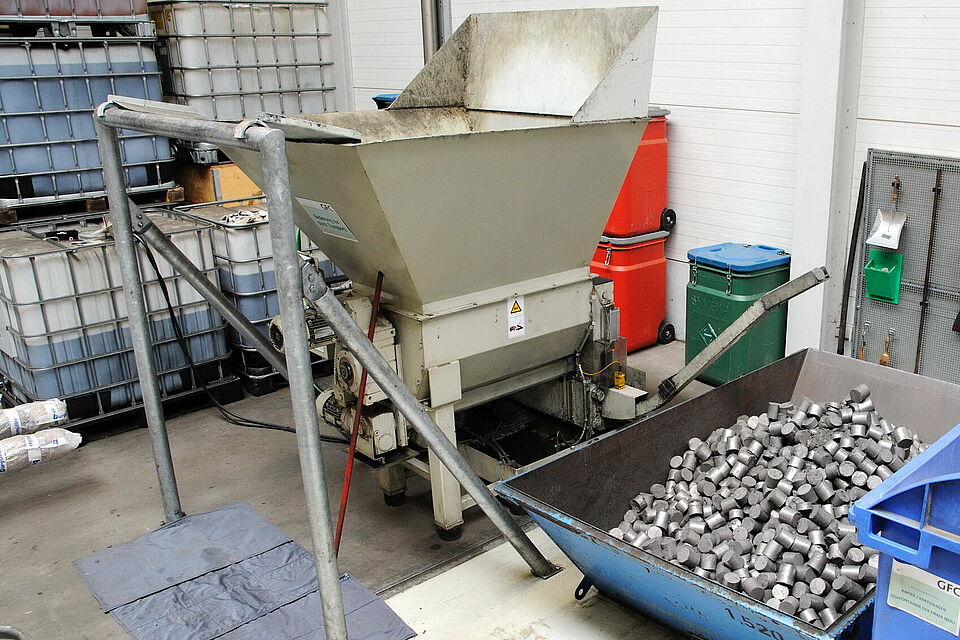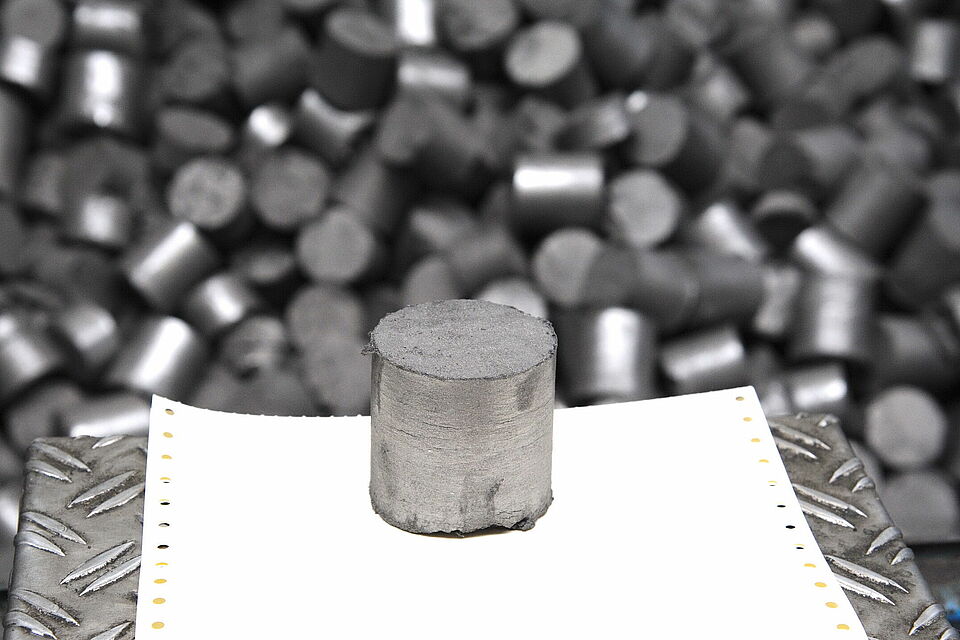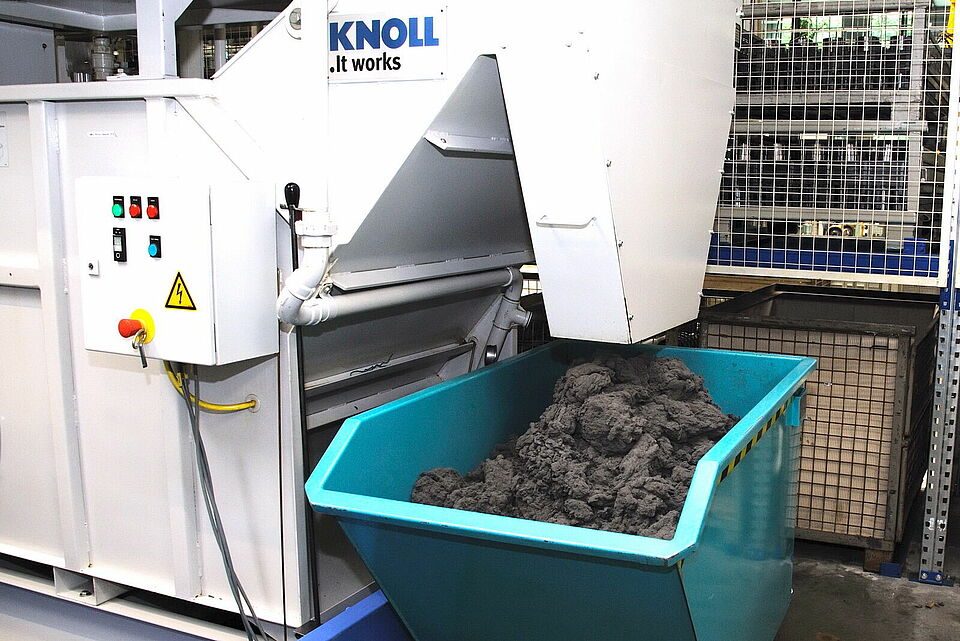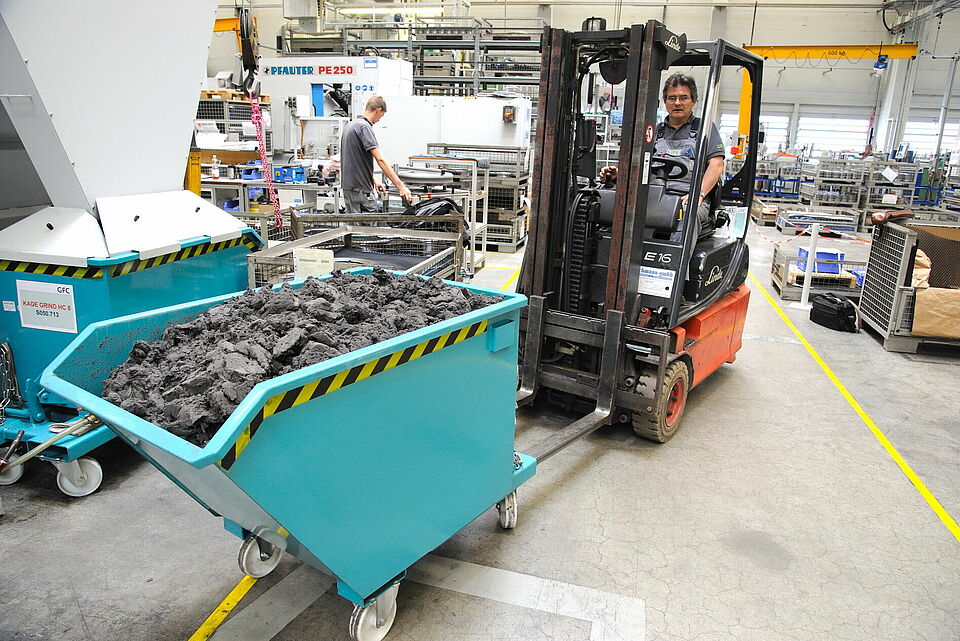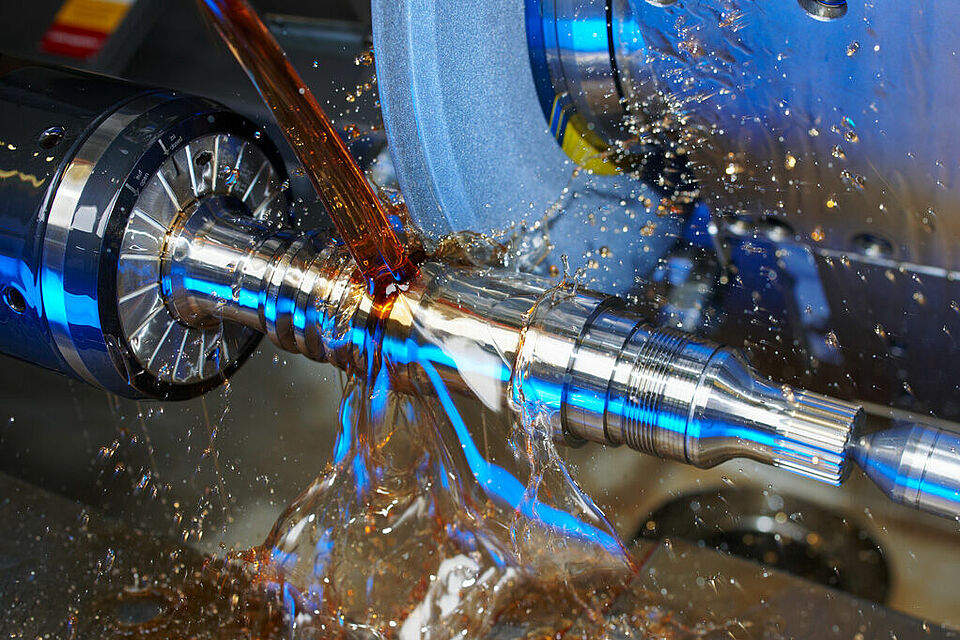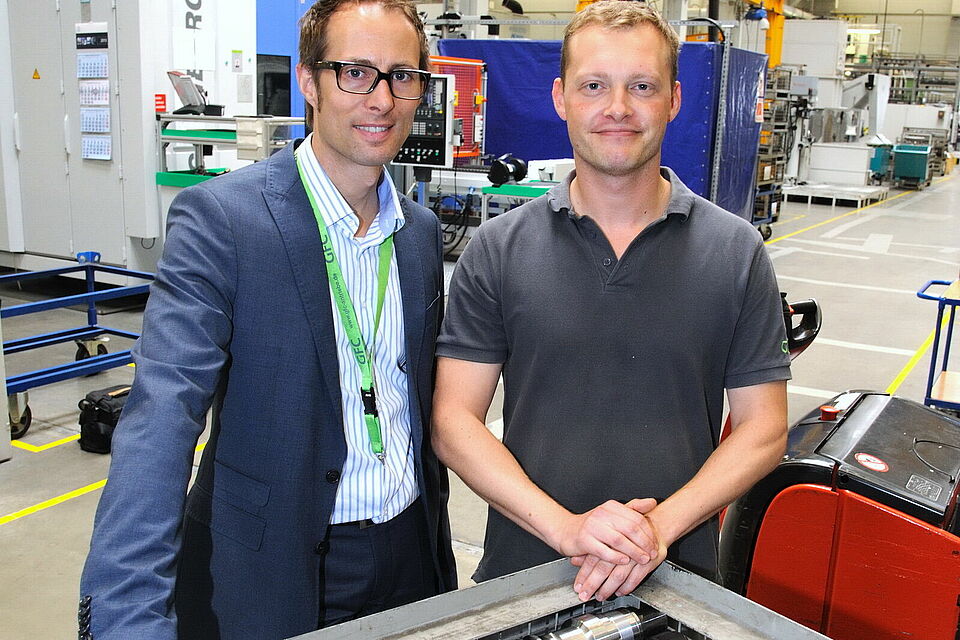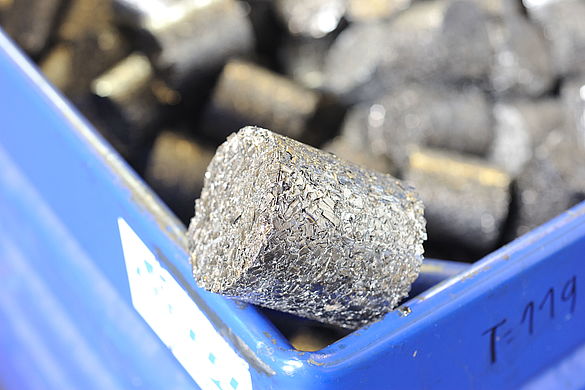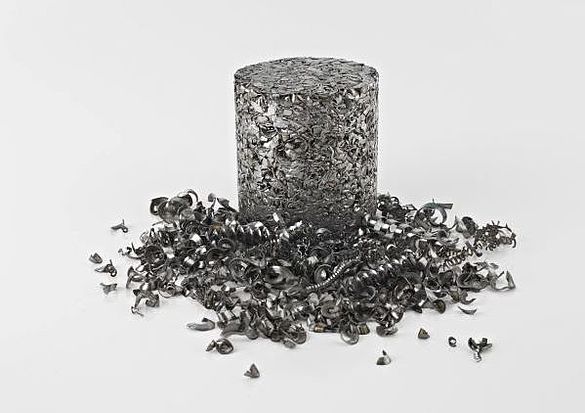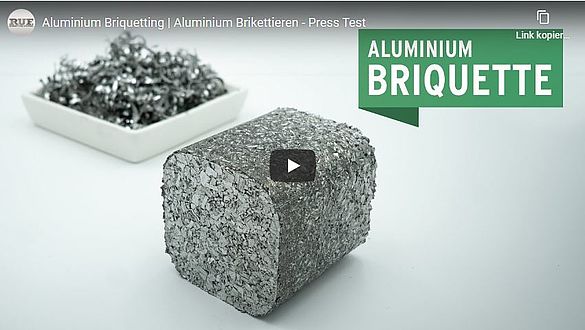RUF briquette press separates oils from metal remnants from grinding work
With a briquette press, GFC Antriebssysteme GmbH was able to significantly reduce their production costs and design the disposal of grinding sludge and millings in an environmentally friendlier manner. The Saxon specialists for worm gears press almost 30 tonnes of expensive cooling lubricants from sludge and millings annually using a system from RUF, and recycle them. Better waste prices are also the target for the remaining, largely oil-free metal briquettes as would be the case for loose millings. Under the line, the investment will amortise itself in only two years.
When the stage scenery changes in the Moscow Bolschoi Theatre or the Dresden Semperopera, worm gears from GFC Antriebssysteme are also used as in the largest seawater desalination facility in the world in Dubai and the world’s largest solar thermal power generator in California. Such gears specially made for customers for an important focus in the company’s product catalogue in Coswig. The sizes and weights vary significantly.
The smallest product has a distance between the worm wheel and the worm camshaft of 50 mm, weighs about 10 kilograms and serves as an armature adjustment gear. The significantly large performance gears form a second group of products forms. They are found in the long-distance natural gas and oil networks, hydroelectric plants, escalators and elevators. The GS 630 is one of the largest of these gears and has an axle offset distance of 630 mm, weights 5.5 tonnes and is appropriate for torques of up to 650,000 Nm. The Gotthard Tunnel’s ventilation system is one of its various installation sites. “Certainly 70 percent of the specialty solutions that we develop correspondingly to customer requests falls in the category of performance gears”, said GFC Product Leader, Markus Weber. Weber also views this as one of the company’s strengths. “We develop and produce customer-specific solutions at very high quality over a very short period of time.”
GFC AntriebsSysteme GmbH…
...produces worm gears and drive systems based on them. This includes wheel sets of worm wheels and camshafts as well as gears and complete drive systems with all electronic and electro-mechanical components. The product catalogue extends from armature adjustment gears with a distance of 50 mm between the axle of the worm wheel and the camshaft to performance gears with 650 mm axial distances and 5.5 tonnes in weight.
GFC supplies the armature adjustment gears to their parent company, AUMA Riester GmbH, one of the world’s largest manufacturers of actuators for the armature industry. GFC develops and produces performance gears in their own name generally as customised solutions for customers all over the world. Sixty to eighty percent are exported depending on the product group. In China, GFC is represented by an assembly and service site. The performance gears contributed heavily to the strong growth, which granted GFC a record revenue of roughly 60 million euros in 2012 with its 220 employees.
Additional growth is already being prepared in the two plants in Coswig. In 2008, Plant II began operations, where the worm camshafts and the worm wheels are ground and routed. Plant I, which is responsible for assembly in the immediate neighbourhood, has been extended in 2013 by a modern logistic centre with automated high-rise warehouse and a powder-coating system.
120 tonnes of sludge and millings are made into briquettes annually
The worm camshafts are manufactured from steel using a profiling grinding machine. The worm wheels are routed from cast iron or bronze. Roughly 50 tonnes of grinding sludge and 70 tonnes of millings are created from the grinding work annually, to which various amounts of oil used as lubricants have adhered. Until 2009, a small part of the cooling lubricant adhering to the metal remnants was recycled with the help of a centrifuge. Of this however, the oil yield was minimal and the proceeds were correspondingly low, which were targeted for the remaining mixtures of metals and oils. In addition, the process was work-intensive and job security was not congenial. The sludge and millings were manually shovelled into the centrifuge and back out, which made the floors dirty.
The use of a RUF RB 4/2800/60S briquette press improved the process decisively, as Markus Weber confirmed. The collection container with the sludge and millings are emptied into the hopper of the briquette press, which generates a specific pressure of 2,800 kg/cm² with the help of a 4 kW hydraulic aggregate. With it, millings and sludge are compressed completely automatically and roughly 97 percent of the adhering oils are pressed out. Finally, the RUF RB4 shoves the cylindrical briquettes with a 60 mm radius out using an outlet chute into a container, which a scrap merchant periodically picks up.
Cooling lubricants recycled by type
The pressed cooling lubricants are pumped into the catching container provided. The largest part of this comes from the grinding sludge, of which almost half of the wet weight is oil. The total mass of the annually recycled oil amounts to about 30 tonnes. GFC discards roughly ten percent of this after a cleaning process. Immediately after pressing, there are a lot of suspended solids the grinding sludge oil in particular, which the filters would quickly add into the cooling lubricants. For that reason, the company allows the pressed oil to rest for several weeks in the container, until the suspended solids contained in it have settled to the bottom. The sufficiently clarified upper part is then pumped off and only the remainder is disposed of. In this manner, 27 tonnes of oil can be recycled annually and re-used.
One uniqueness of this system consists the fact that the various oils for grinding and routing work are recycled by type without having to change the hose connections. The system has been set up with two suction pumps, which are controlled by a selection switch. The operational parameters specific for the materials are stored in the control system for making briquettes of the various materials: grinding sludge and millings. The appropriate pressing programme is activated along with the suction pump simply be switching, which ensure an ideal briquette result.
Briquetting system requires only minimal personnel
The briquetting system requires only minimal personnel in the entire production process, as Weber explained. If one of the collection containers on the grinding and routing machines has been filled, a forklift will transport it to the briquette press and empty it into its hopper. As soon as the responsible employee starts the corresponding programme, the sludge or millings are pressed and the oil is automatically pumped into the proper collection container. Level sensors in the oil containers ensure that the press will stop if the container threatens to run over.
The GFC employees make sure that they don´t switch between millings and sludge all the time in order to minimise the movement of the various oils. Thus, they press the several uniform batches one after the other, before switching from millings to sludge or vice versa.
While the grinding work continues around the clock, the briquette system is only loaded during the two day shifts. In addition to filling and starting the press, only the basic cleaning necessary in multi-week intervals needs to be done. The annual maintenance is performed by the GFC Antriebssysteme GmbH maintenance staff. “Since its activation, we have not needed to call the RUF’s service department. The system functions completely without problems”, stated Production Leader Weber.
The investment had been amortised after only two years
The initiator for the procurement of the briquette system was the idea of GFC employee, Stefan Kändler. With all of its problems, the centrifuge was a thorn in his side for a long time. For that reason, he suggested optimising the disposal of the sludge and millings by making them into briquettes as part of the ongoing improvement program. The idea of the deputy team leader for the gear grinding proved itself quickly as a good alternative. GFC calculated how much additional oil could be recycled through making briquettes, how much more profit for the largely dry metal remnants would result and how much work could be saved. Production Leader Weber remembers, “RUF supported us in these calculations by doing press tests with our materials and determining the value of the recycled oil.”
At the beginning, RUF was only one of several providers, who bid for the contract with GFC in order to compare the business and technical aspects. “We finally decided for RUF because the consultation was just as the price-performance ratio for the briquetting system”, said Weber.
The calculation succeeded and the RUF RB 4/2800/60S briquette system quickly paid for itself. Recycling the 27 tonnes of oil annually, roughly 20 percent of the total need, made saving of up to 30,000 euros possible. The saved costs in personnel as well as the higher profits from the sale of the almost oil-free metal remnants were added to that thanks to the automated operation. After about two years, the briquette system amortised itself in this manner, according to Markus Weber, and this even though the system laid out for 24-hour operation is only in operation part-time. However from the view of the growth of GFC, the Production Leader expects to reach full workload soon, “Aside from this, we are certain to purchased a second system sooner or later.”

